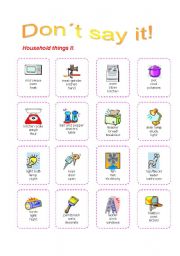
|
Don�t say it! 2
A second set of cards on which there are household things to describe. The aim of the game is to cut up the cards, distribute them among students who are to describe the things on the cards without using the words that are writen under each picture. The students therefore practise speaking and household vocabulary using their imagination.
Level: intermediate
Age: 12-17
Type: activity-card
Downloads: 73
|
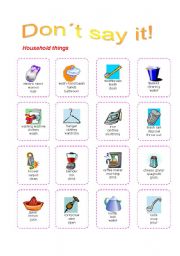
|
Don�t say it!
Those acticity cards are aimed at household vocabulary and speaking. The aim of the game is to describe the thing in the picture without saying the most common words for each thing that are writen on the cards. One student speaks about the thing in the picture and the others try to guess what thing s/he is talking about.
Level: intermediate
Age: 12-17
Type: activity-card
Downloads: 64
|
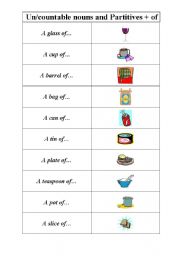
|
Uncountable and countable nouns and partitives to go with them
Activity cards to be cut up, placed on the table and again matched by students. There are two diffend sets of cards. First set contains partitives such as a bottle of... and the second set contains pictures to match e.g. wine to form foe example
A BOTTLE OF WINE et cetera.
Level: intermediate
Age: 8-17
Type: activity-card
Downloads: 62
|
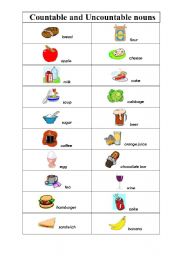
|
Countable and uncountable nouns
Activity cards teaching the difference between countable and uncountable nouns that could be cut up or left together. Students should decide which nouns in pictures are countable and which are uncountable and then try to deal with articles to go with each group. The cards are followed by a table containing grammar points concerning this matter.
Level: elementary
Age: 6-17
Type: activity-card
Downloads: 105
|
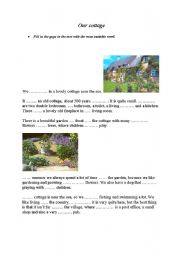
|
Our cottage gap-fill
An exercise to be filled in with different parts of speech. It also serves to teach students to describe a place to live or their own house and its surroundings.
Level: elementary
Age: 6-17
Type: worksheet
Downloads: 4
|
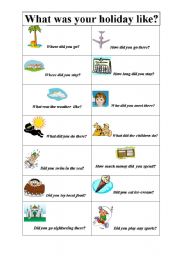
|
What was your holiday like?
Activity cards and a follow-up exercise to be used to teach past simple questions aimed at holiday, regular and irregular verbs in the past and to speak and write about your last holiday, weather, holiday activities and places to stay and visit.
Level: elementary
Age: 6-17
Type: worksheet
Downloads: 45
|
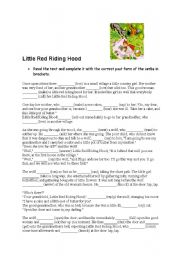
|
Little Red Riding Hood
This is a well-known story to be completed with the correct form of the verbs in brackets. As students read the story they should change the verbs into the past simple minding which verbs are regular and which irregular. This exercise might be followed by asking and answering questions about the text, e.g. Did she gather some flowers on the way?
Level: elementary
Age: 8-17
Type: worksheet
Downloads: 31
|
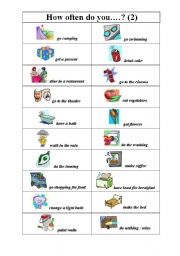
|
How often do you..?
A second set of cards to teach and learn speaking about routines using definite and indefinite adverbs of frequency when answering the question How often do you ....?
Level: elementary
Age: 6-17
Type: activity-card
Downloads: 61
|
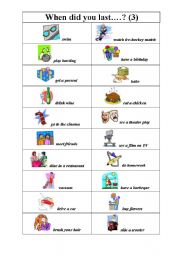
|
When did you last ?
Another set of cards to be used to teach past simple in questions and answers, to teach regular and irregular verbs and different time expressions such as LAST, AGO, YESTERDAY etc.
Level: elementary
Age: 6-17
Type: activity-card
Downloads: 63
|
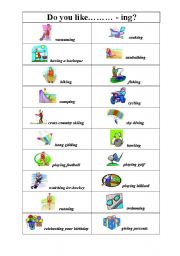
|
likes and dislikes
Cards to be used to teach and speak about likes nad dislikes and to practise using gerundium after verbs such as LIKE, DISLIKE, HATE, PREFER, LOVE etc.
Level: elementary
Age: 6-17
Type: activity-card
Downloads: 47
|